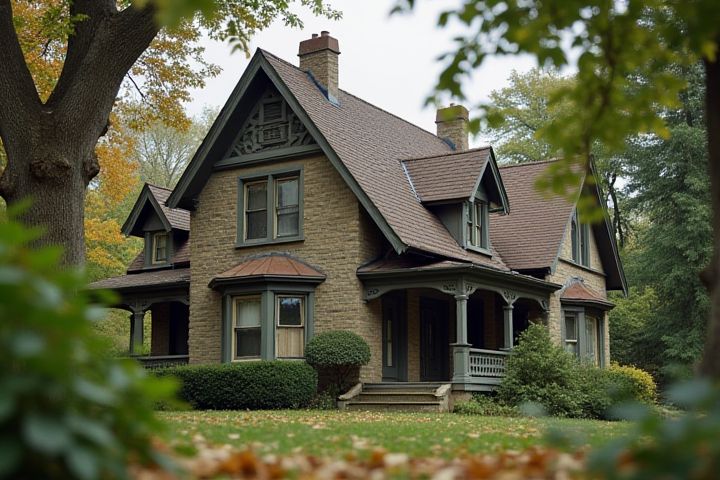
To uncover the history of a house, begin by checking public records at your local county recorder's office or online databases, which often contain property deeds and tax assessments. Researching the house's history may also involve visiting local libraries or historical societies, where you can access archived newspapers and city directories. Consider utilizing online platforms such as ancestry websites and historical census data, which may provide information about past residents. You can also explore neighborhood associations or community forums for oral histories or anecdotes from long-time residents. Finally, examining the home itself for architectural details or unique features can reveal insights into its age and possible previous renovations.
How To Find House History
Check local property records.
To uncover a house's history, begin by checking local property records through your county assessor's or recorder's office. These public records typically contain vital information such as previous owners, sale prices, and property tax details, often dating back several decades. You can access these records online or in person, depending on the county's resources. By reviewing this data, you gain insights into the property's historical value and any changes made over time, enriching your understanding of its background.
Visit the county tax assessor's office.
Visit the county tax assessor's office to gather crucial information about your property's history. There, you can access public records that include tax assessments, ownership changes, and property valuations over time. This information not only illuminates past ownership dynamics but also reveals any historic liens or tax issues associated with the property. Understanding these details can enhance your knowledge of its value and help you make informed decisions regarding potential purchases or renovations.
Explore online databases and archives.
Exploring online databases and archives can reveal a wealth of information about a house's history. You can start by accessing property records through local government websites, which may include tax assessments, ownership transfers, and deed information. Historic preservation organizations often provide databases containing details about past occupants and significant events associated with the property. Websites like Ancestry.com and FamilySearch can enhance your research by connecting you with census records and historical documents that may provide insights into the previous owners and their stories.
Search historical deed records.
Search historical deed records through local county offices or online databases to uncover the ownership history of your property. These records typically date back several decades, providing valuable information about previous owners, purchase prices, and any property transfers. In many cases, you can access these documents via the official county registrar or a dedicated online platform, often free of charge. Key details, such as the grantor and grantee names, will help you track the lineage and any potential liens against the property.
Visit the local library or historical society.
Visiting your local library or historical society is an effective way to uncover the history of a house. Many libraries maintain archives that include old property records, local newspapers, and city directories that date back decades or even centuries. Historical societies often offer access to photographs, maps, blueprints, and oral histories that provide context about the era in which the house was built and its previous occupants. You can also inquire about any local historians or volunteers who specialize in genealogical research to assist you in your quest for detailed information regarding your home's past.
Investigate old city directories.
Investigating old city directories can unveil valuable insights into your house's history, revealing its previous occupants and significant events. These directories often list residents by name, address, and occupation, providing context about the neighborhood and its development over time. You can access these resources at local libraries, historical societies, or online databases, which may host digitized versions for easy searching. By cross-referencing these directories with property records, you will gain a deeper understanding of your home's legacy and the evolution of your community.
Consult a professional genealogist.
Consulting a professional genealogist can significantly enhance your search for house history, providing expertise in tracing ownership records and uncovering the property's past. These specialists utilize a variety of resources, including local archives, property deeds, and historical maps, to construct a comprehensive timeline of the house. They can also help uncover fascinating stories tied to previous owners, including significant events or notable figures linked to the property. Engaging a genealogist allows you to gain deep insights into your house's history, enriching your connection to the place you call home.
Use online genealogy websites.
To uncover the history of a house, begin by utilizing online genealogy websites such as Ancestry.com or FamilySearch.org, which allow you to track previous owners and occupants. These platforms often provide access to public records, including property deeds, census data, and historical maps that can reveal how the home evolved over time. You can enhance your research by cross-referencing these findings with municipal records available through local government websites or archives. Engaging with community forums focused on local history can also yield valuable insights and personal anecdotes about your house's past.
Examine old maps and land surveys.
To uncover your property's history, examining old maps and land surveys is crucial, with many archival resources available online and at local libraries. Look for plat maps, which detail property lines, owner names, and any changes in land use over time, often dating back to the 19th century. Historic aerial imagery can show how the landscape evolved, revealing past structures or land utilization patterns that may no longer exist. Engaging with your local historical society can also provide access to rare documents and insights that might not be readily available in public records.
Contact previous owners or neighbors.
Contacting previous owners or neighbors is an essential step in uncovering a home's history. Previous owners can provide unique insights into renovations, maintenance issues, and the property's historical significance. Engaging with neighbors often reveals valuable information about the neighborhood's evolution and community dynamics over time. Consider reaching out through local social media groups or community events to establish connections that can enhance your understanding of the property.
